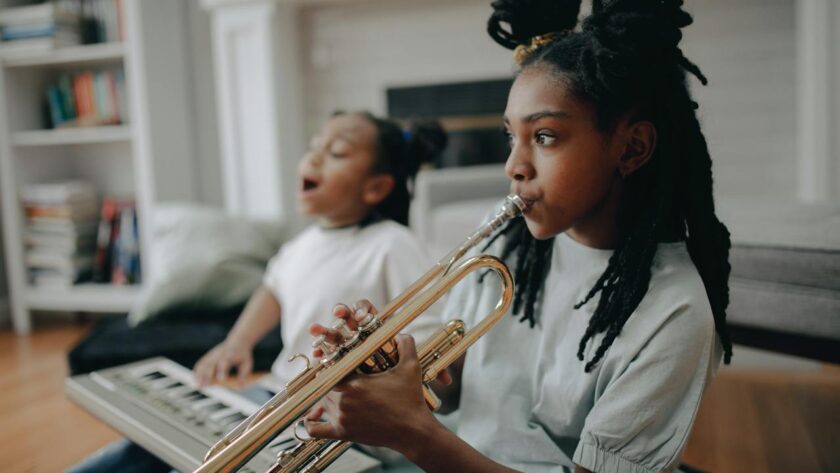Musical instruments can be a significant expense for families. Luckily, community music programs collect used instruments that gather dust, refurbish them, and put them into kids’ hands. Arts education programs foster cognitive development, increase creativity, and improve social skills. It has also been shown that students who play an instrument attend school more regularly and have better standardized test scores.
Improved Academic Performance
Students in low socioeconomic backgrounds often need help accessing musical instruments to play outside of school. This is due to a need for more funds for lessons and education resources and the cost of instrument repair. Research shows that students of all ages who participate in music classes experience improved academic performance. This is why music teachers consider fundraising among their most important responsibilities. Even in schools with large budgets, teachers must raise money for additional materials and equipment to supplement classroom instruction. Learning to play a musical instrument requires dedication, discipline, and teamwork. These skills can help students excel in school and life as they develop executive functions such as focus and time management. By promoting music instrument donations and encouraging community members to contribute, educators can help reduce the number of cut-school music programs. This can benefit both the children in those schools and their families. This is why a recent study found that students in schools with music programs have better attendance rates, GPAs and test scores, and lower discipline reports than their non-music peers.
Increased Creativity
Many school programs face financial strain, leading to cuts in music education. This can deprive children of the opportunity to experience the creativity, imagination, discipline, and confidence that learning a musical instrument provides. However, it is possible to encourage and sustain students’ participation in music programs by arranging for instrument donations. Teachers and schools can collaborate with local musicians, community philanthropic organizations, instrument retailers, and media outlets. Musical training fosters creative thinking, which is essential for all life aspects. It is a skill that can be used to solve complex problems, develop innovative solutions, and see new possibilities in everyday situations. Creativity is also crucial to many successful careers, including business and science. Although research supports the positive effects of music lessons on academic performance, the causal evidence is inconclusive. Observational studies may be affected by unmeasured variables, such as intelligence, personality traits, and socioeconomic status. To be able to identify the impact of music teaching, experimental designs are needed. These studies can distinguish the effect from other factors that could influence outcomes, such as the participants’ prior educational achievement and general intelligence level.
Increased Self-Esteem
Studies have shown that musical instrument students score higher on standardized tests. This may be because music helps children hone their motor and language skills, which can improve their overall academic performance. It also helps children build self-confidence and teaches perseverance and valuable life skills. Moreover, learning music gives kids a creative outlet for the rest of their lives. This can help reduce feelings of depression and anxiety, which is a big deal for kids living in poverty. Music can also boost a child’s self-esteem by allowing them to perform in front of an audience. This is an excellent way for them to showcase their talent and get feedback from other musicians and their community.
If you have a musical instrument sitting in your home, consider donating it. It could make a difference in the life of a child who needs it the most. Not only will it expand their ability to learn, but it can also improve their self-esteem and give them a greater chance at academic and lifetime success.
Increased Social Interaction
Music has the power to bring people together. Research shows that when people from different cultures exchange their music, they learn more about each other and better understand other ways of life. This can help promote peace and reduce tension. Similarly, high school students involved in music programs are less likely to smoke or take illegal drugs and are more likely to do charity work. In addition, schools with well-established music programs have higher graduation rates than those without them. Despite this evidence, many schools cannot provide instruments for their students because of financial constraints. This is why some local organizations bringing musical instruments to underserved kids ask for donations. The organization accepts all band instruments but primarily looks for flutes, clarinets, and French horns. The organization is also offering monetary donations to offset the cost of repairs on the donated devices.
Better Health
When you practice an instrument, your brain builds muscle and strengthens neural connections. This helps improve your memory and cognitive ability. Musical training also develops both the left and right sides of the brain. This can boost your creativity and help you find solutions more quickly. Creating music causes the brain to release endorphins, natural chemicals that make you feel good. It can relieve stress and reduce pain. This is why many people with mental health problems like anxiety and depression find relief through playing music. Music can also be used as therapy to treat dementia and early-onset Alzheimer’s. Studies show that people who learned a musical instrument in their youth are less likely to suffer from these diseases later in life.




